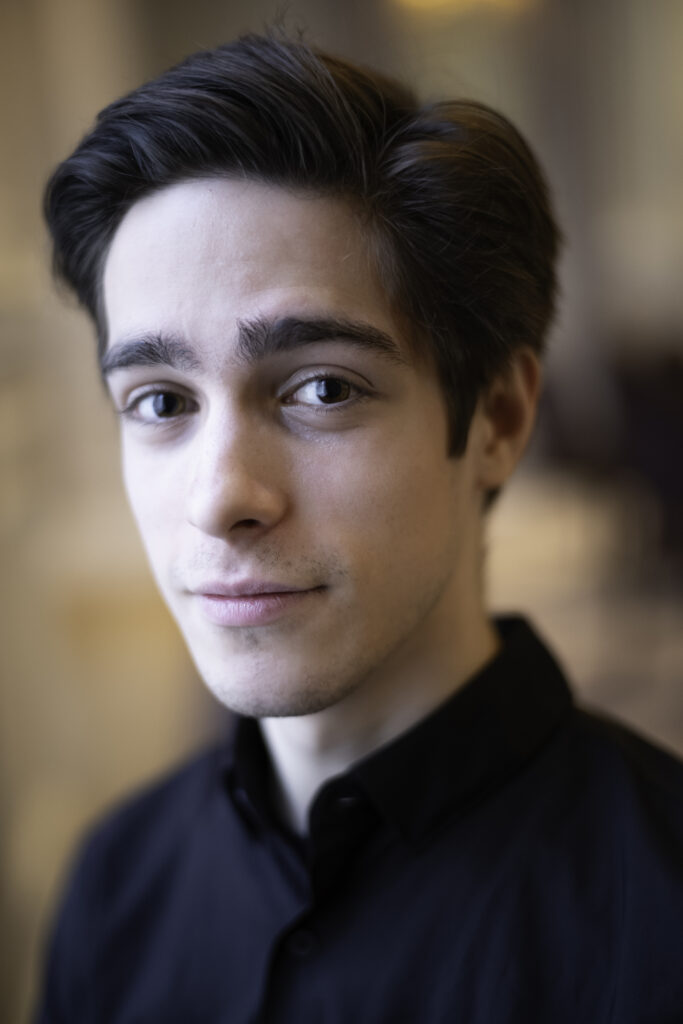PITTVILLE PUMP ROOM
CHELTENHAM SPA
6 MAY, 2025

Russian pianist Alexander Doronin started his undergraduate course at the Royal College of Music in September 2021 as an ABRSM Scholar. He is currently studying with Professor Dmitri Alexeev (piano). From 2015 to 2021, Alexander studied at the Gnessin Moscow Special School (College) of Music with Professor Mikhail Khokhlov (piano) and Olga Martynova (harpsichord). Alexander is the Eileen Rowe Musical Trust award holder, and is also supported by the Drake Calleja Trust.
Alexander Doronin has achieved remarkable success in piano competitions, including First Prize at the Moscow Piano Open International Competition (2019), playing Beethoven’s Sonata No 16; Third Prize at European Piano Competition in Bremen, Germany (2024), playing Beethoven’s Fourth Piano Concerto; Second Prize at the International Piano Competition in Lyon (2024), Second Prize at the Vladimir Krainev Competition for Young Pianists (2019), playing an astonishing Petrushka.
Alexander also participated in various music festivals such as The XXX International Chopin Piano Festival in Gaming Abbey (Austria), the 4th and the 5th Festivals of the Russian Chamber Music «Winter Nights on the Amstel» (Amsterdam, Netherlands), Dmitri Alexeev’s ‘Beyond Boundaries’ Music Festival in London, Scriabinfest (Moscow, 2022), ‘Pianissimo’ festival in Repino, Saint-Petersburg (2021) and others.
TODAY’S MUSIC
Ludwig van Beethoven (1770–1827)
Piano Sonata No. 16 in G Major (Op.31 No. 1)
I. Allegro vivace
II. Adagio grazioso
III. Rondo, allegretto – presto
Sergei Prokofiev (1891–1953)
I. Andante dolce – Allegro moderato
II. Andante sognando
III. Vivace
Beethoven’s Piano Sonata No. 16 was written in 1801–2 as the composer, telling a friend ‘From now on, I’m going to take a new path’, decided to modify the sonata form as perfected by Haydn and Mozart. The new work has touches of humour and irony. András Schiff, the Hungarian-born British virtuoso, is among those who think the long second movement was intended to parody Italian opera, which had begun to eclipse his popularity. ‘It’s very beautiful,’ said Schiff, in a masterclass, ‘but it’s alien to Beethoven’s nature.
Sergei Prokofiev was born in Sontsovka, then Russia but now part of Ukraine. After graduation from Saint Petersburg Conservatory he travelled around Europe earning a living before heading to the USA like many of his peers. Unlike them, though, he returned to the Soviet Union, in 1936, working relentlessly to satisfy both his own restless muse and his state sponsors. This piece was composed in 1939, after a catalogue of professional and personal disasters, including the detention of his flamboyantly experimental collaborator Vsevolod Meyerhold (later executed) and the brutal murder of Meyerhold’s wife. It was not performed until 1944, when the three major piano works written in 1939 were hailed as ‘the war sonatas’. This one is dedicated is second wife, Mira Mendelson, who, friends noted, had managed to make him smile. Like most of Prokofiev’s music it features mercurial changes of mood and direction, from melancholy lyricism to pounding motoric grandeur.